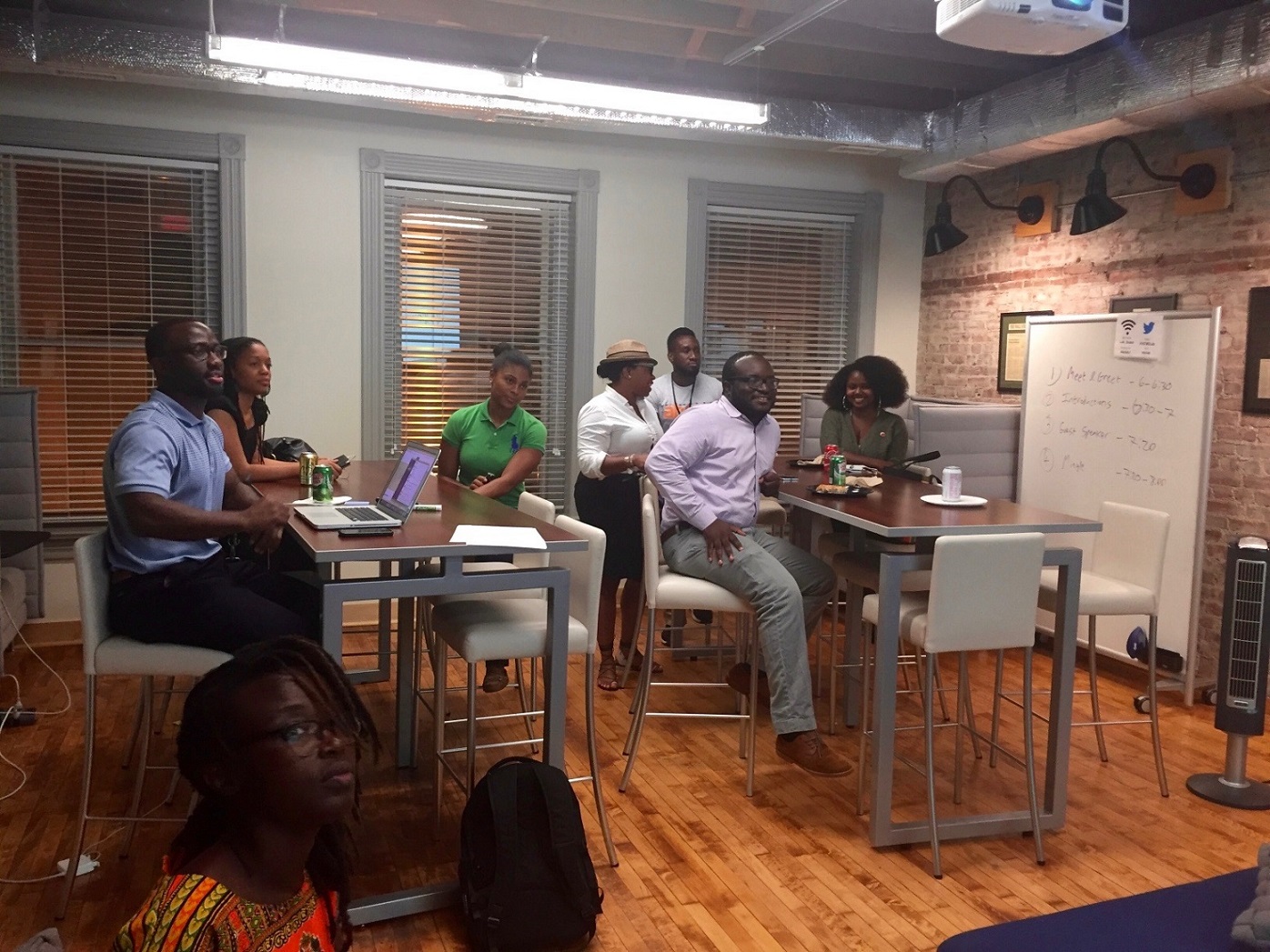For Black Code Collective (BCC) cofounder Taylor Poindexter, creating a space for Black technologists to unpack the day-to-day of the industry was a personal need.
“I felt like, even though I had a good support system, I had a lot of male, white friends that were supportive, but certain things they didn’t really get,” Poindexter told Technical.ly.
After expressing her concerns to fellow cofounder Lougenia Bailey, Poindexter realized she wasn’t the only one feeling this way about the DC tech scene.
A few months later, with the help of fellow cofounders Emmanuel Apau, Malick Diarra and Stephon Harris, BCC was born in the late months of 2016.
Created as a space for Black developers in the area to meet, share resources and help one another out when it came to the shortcomings of #dctech, it now boasts a massive community in its Slack channels, local meetups and social media presence.
Five years in, it hosts over 2,000 members and serves as a place for community members to get a leg up in job searches, discuss salary transparency, learn about the software development scene in the DMV and, if necessary, express any concerns and frustrations with, well, everything.
Black Code Collective is officially 5 years old and we would like to take a little time to look back at the last 5 years.
— BlackCodeCollective (@blkCodeCollctve) September 15, 2021
But the mission of BCC wasn’t always so clear, said Poindexter, who is now gearing up to take on an engineering manager role at audio streaming company Spotify. When they were first starting out, the founding members said it took a few different attempts to figure out what was really going to stick and resonate with the community.
“I just made it happen kind of by trial and error,” Poindexter said. “We started out at [ECMC Innovation Lab] as our venue spot, just trying to figure out exactly what the community needed most and how we could provide the most value in trying to create that safe space.”
Apau, currently the CTO of Mechanicode, said that he first wanted to create something like Black Code Collective to help new entrants into the tech scene find their place. At the time, he said, he was teaching bootcamps, and kept running into the problem of students paying to take the course, then realizing they didn’t actually want to be a software engineer.
“[I thought], what if they actually had a community or somebody to talk to and say, hey, what exactly is the day-to-day of an engineer?” Apau said. “What type of problems are you guys typically solving… instead of just saying, ‘Oh, engineers are making over $100K. Yeah, I want that.'”
With BCC, Apau said, young students or new entrants into the tech community can find space for themselves in management or other roles by talking to others already with the job.
‘Long-term quality’
While it’s had to take a pause on many of its in-person offerings — including hackathons, happy hours and IRL meetups — BCC has seen significant growth since the start of the pandemic (and it’s not the only online DC community to grow over the past 18 months). The move to virtual and the rise in discussions about race that began last June both upped BCC’s membership count, the founders said, as people wanted to be more involved.
Brandon Coates, executive director of BCC, noted another growth trend that’s followed the group’s evolution: the growth of DC tech itself. As the city adds more technologists from big tech companies like Google and Amazon (and as homegrown DC startups turn into growth companies), he’s seen more members join with some big-name credentials, building the group’s clout and adding even more opportunities for its members to get a leg up.
“The DC tech scene has gone up, so now we have people working for big tech companies, working for startups and government contractors,” Coates said. “So now you can ask a question and it’s interesting to get different viewpoints on it, so I think that growth has really helped us, as well.”
It’s grown from the top-down, as well. What started out with a handful of cofounders has now moved to a 15-member leadership team that’s helping out amid the spike in members. Still, while the collective does get sponsorships, these leadership roles remain volunteer-based positions created to help out the community, even as membership needs grow and change with the tech scene.
Having that community to feel seen, I feel like that is very empowering to be able to have even a more fulfilled career than you may have thought you could have in the past.
“As we’ve grown, the founders have had to find ways to make sure that this can last the long-term,” Poindexter said. “Because one thing we wanted to really differentiate us from other tech meetups that we had seen when we started this, is that we didn’t want to be around for a couple of years and fizzle. We wanted to be able to give people long-term quality.”
Among community-building and events like webinars and hackathons, one of the biggest assets of BCC is its job and salary transparency offerings. In addition to offering a space for engineers to share their positions and salaries, it also has an anonymous spreadsheet where professionals can share how much they’re making and at what company.
Coates noted that this has been particularly useful when it comes to negotiations and empowering applicants to ask for what they’re worth from employers — and making sure they’re getting the same pay as their white counterparts.
Along with the spreadsheet and BCC discussions, he noted, Poindexter herself is also one of the most active individuals in the push for salary transparency in the DMV.
“I always joke, if anybody says anything about money, I’m like, go talk to Taylor,” Coates said.
An additional benefit of the community, Poindexter added, is that it also helps people to apply for roles they might not have otherwise, through the visibility of seeing the success of fellow Black technologists. Plus, she said, the BCC can then connect applicants to companies and new positions through its network.
“Having that community to feel seen, I feel like that is very empowering to be able to have even a more fulfilled career than you may have thought you could have in the past,” Poindexter said.

Inside a Black Code Collective meetup (photo via Twitter).
Into the future
We were there back when BCC first started, asking then-recent Texas transplant Harris about starting the group and his hopes for it.
“I would like to see a support pipeline that enables underrepresented minorities to gain interest in STEM and to continue to cultivate experiences inside the professional environment,” he told Technical.ly at the time.
So far, it seems like the group has achieved much of that vision. But there’s still more to come. Although it has already seen a good amount of success since its creation, the members of the BCC leadership team still have a few goals they’d like to see happen.
The current bucket list includes staging a BCC conference and adding even more resources for young people, like high schoolers and other students, to help them figure out their own space in the tech industry as they consider careers.
Plus, Apau added, there’s always room for growth and new ideas that the founding team hasn’t even thought of.
“I would like to make sure that the next generation feels empowered to be able to come up with ideas and not feel like they’re being stifled by, potentially, our original ideas,” Apau said. “I’d be curious to see what the next generation does with Black Code Collective.”
Primarily, though, Apau said he wants area employers and technologists to take away one of the biggest impacts of BCC: its presence as a large and growing community. When companies see one technologist from BCC, he said, it has helped them know that they are part of a larger collective of Black engineers capable of moving the DC tech community forward.
“That’s the impact that we definitely have been driving over the last five years,” Apau said. “That when you see a Black engineer at a company, typically, there’s usually one or two of us, but now you realize that, okay it’s not just those one or two that are unique, but there’s a large number of us out here and we’re here to be taken seriously.”
Join the conversation!
Find news, events, jobs and people who share your interests on Technical.ly's open community Slack

DC daily roundup: $10M to streamline govt. contracting; life sciences might dethrone software; Acadia's new $50M

DC daily roundup: the DMV's VC cooldown, SmartSigns for safer driving; Rep. Schiff's AI copyright bill

Will the life sciences dethrone software as the king of technology?


